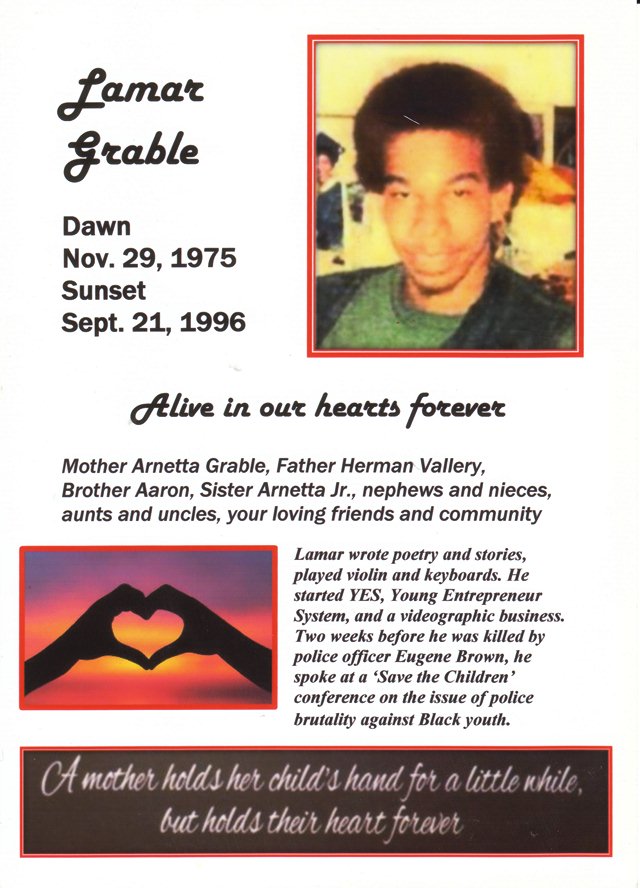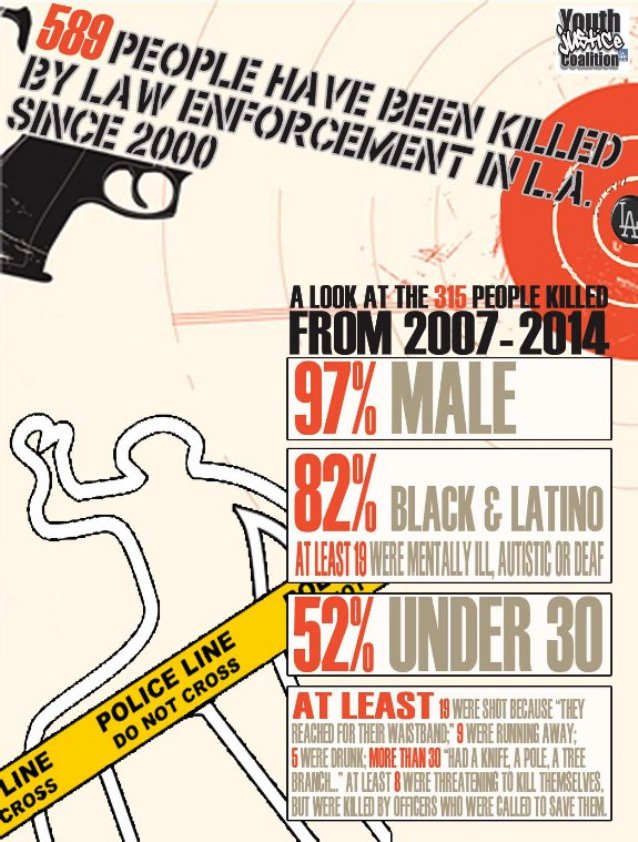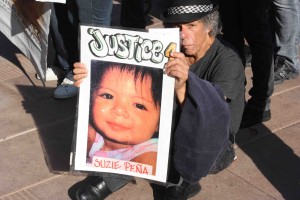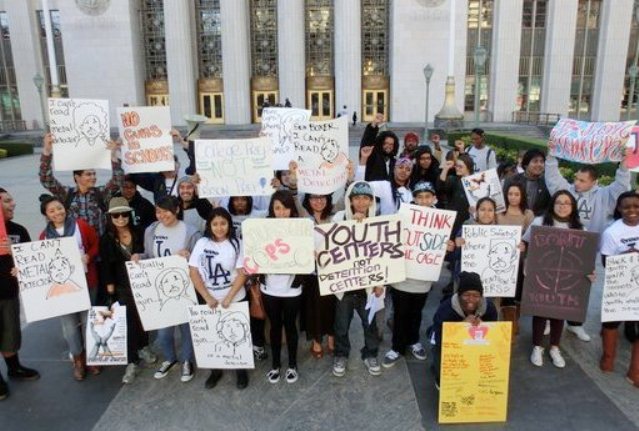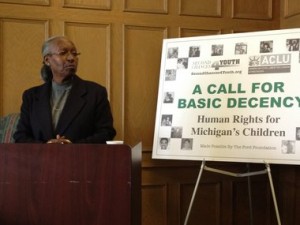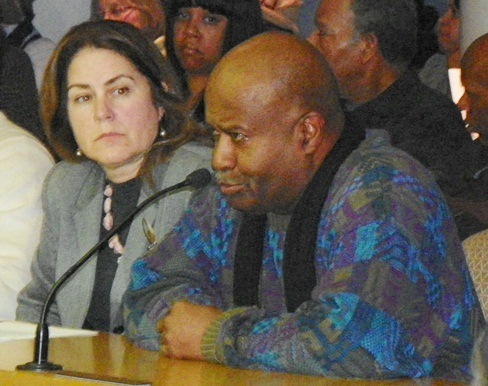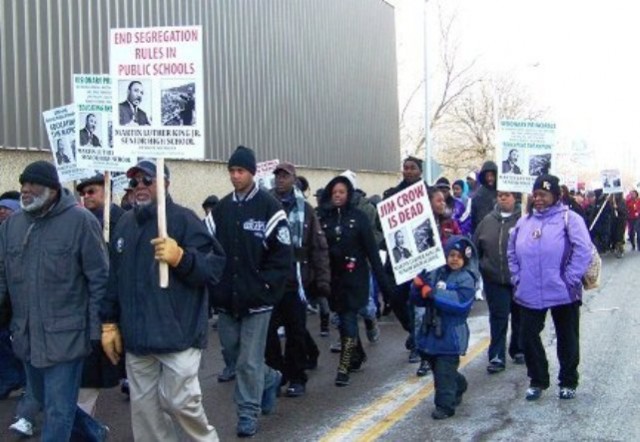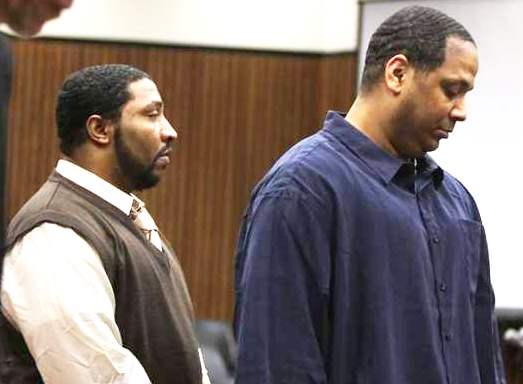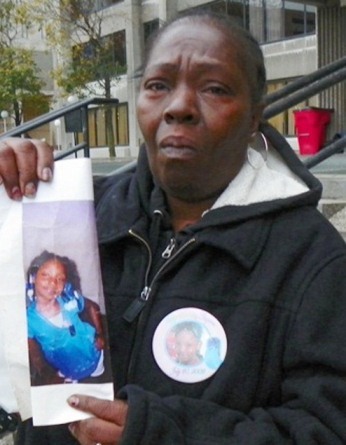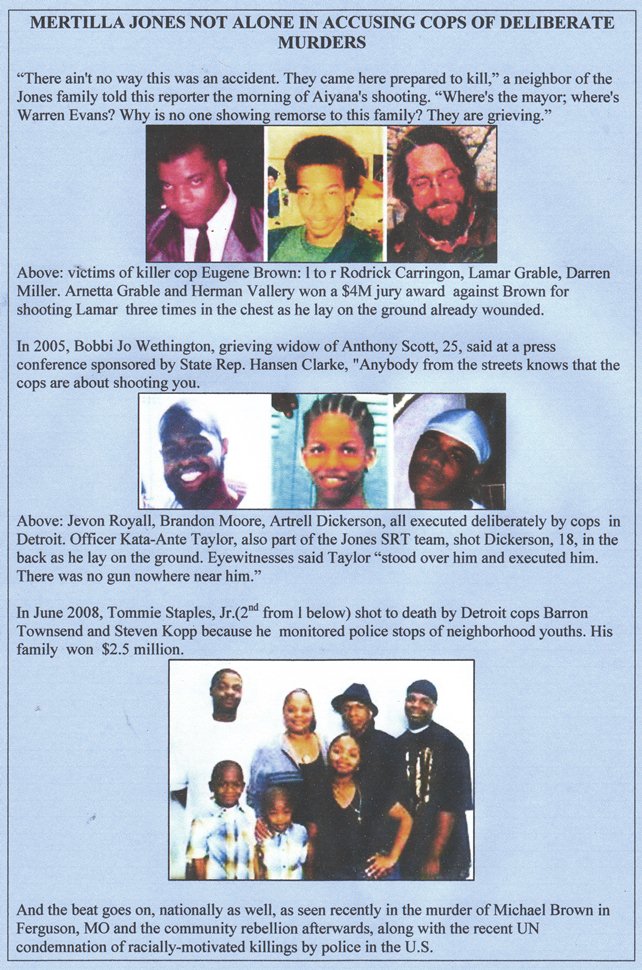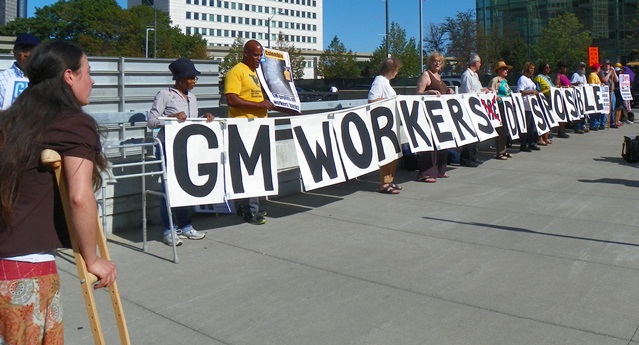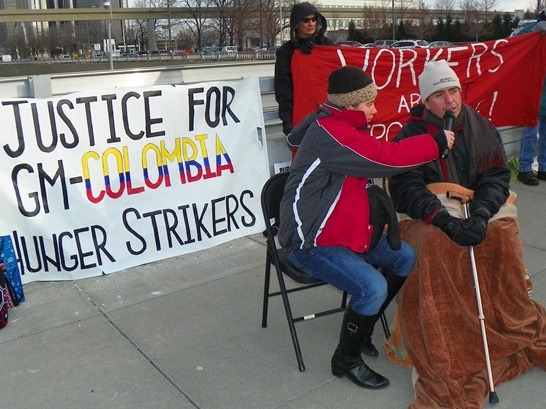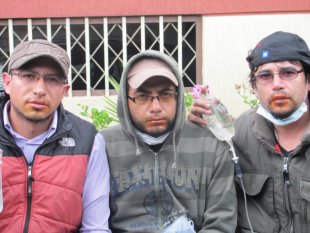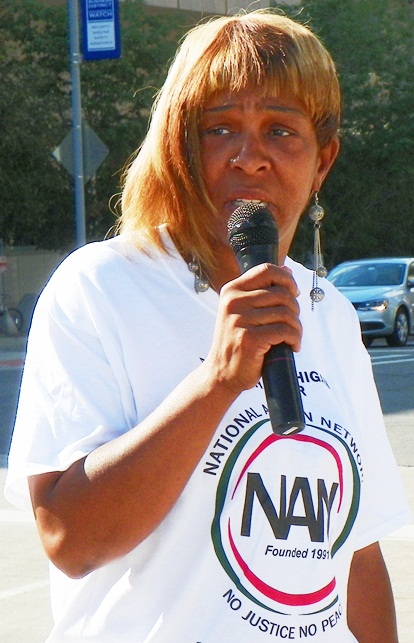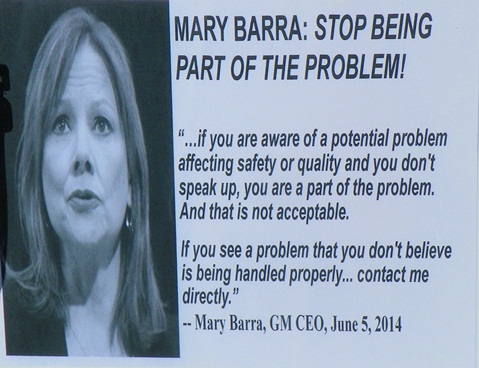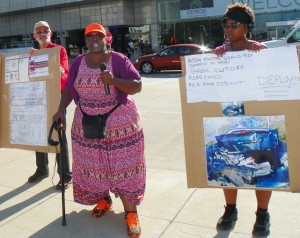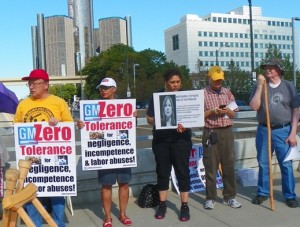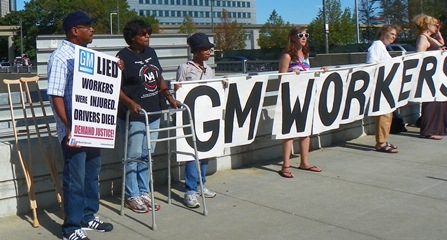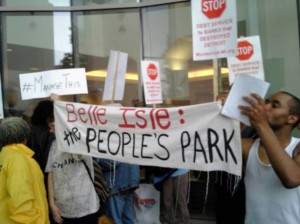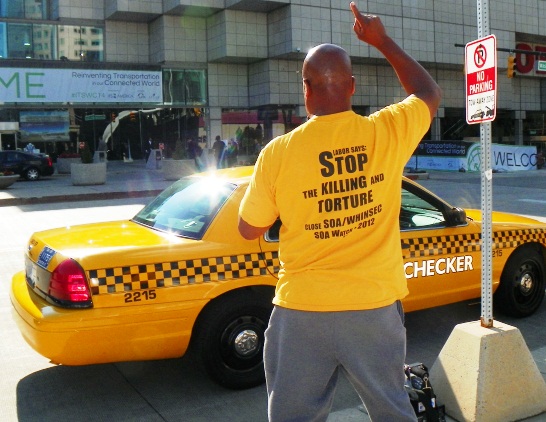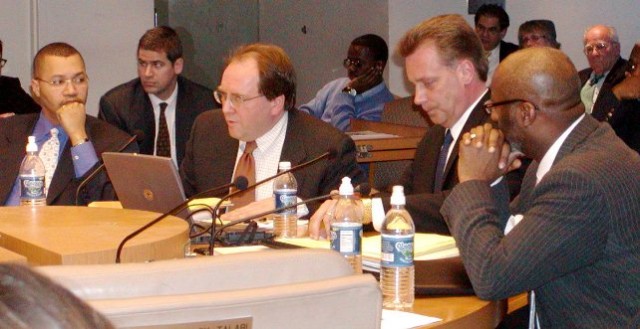Video above by Silo Sh3llz “RIP Aiyana Jones”
NOTE: VOD WILL HAVE STORY UP LATER TODAY ON EVENTS IN THE COURTROOM SEPT. 24.

- Mertilla Jones (l) weeps in agony at candlelight vigil for Aiyana shortly after her death; Aiyana’s mother Dominika and father Charles are at right.
Aiyana’s grandmother Mertilla Jones broke down weeping uncontrollably on the stand Sept 24 and repeatedly asked Weekley WHY he had killed her granddaughter and then lied about her trying to get his gun.
She was escorted from the courtroom, and continued directly accusing him as she passed. Numerous relatives seated in the court also began weeping uncontrollably, including a young man who was sobbing and hyperventilating in the hallway outside. After Aiyana’s mother and aunt asked to speak to her to calm her down, Ms. Jones came into the hallway and slid to the floor while Dominika Jones and LaKrystal Sanders consoled her, crying as well. At least six family members in the hallway surrounded her, some weeping as well, for a lengthy time before court officers escorted them outside so Ms. Jones could get some fresh air. Judge Cynthia Gray Hathaway, who earlier threatened witnesses with arrest after LaKrystal Sanders similarly broke down prior to Mertilla Jones’ testimony, halted the trial for the rest of the week.
SRT officer says he found shell casing from fatal bullet by front doorway
Evidence techs photographed it in middle of room two hours later
Firearms expert: MP-5 gun could not have gone off accidentally
Police testimony replete with military jargon
September 23, 2014
By Diane Bukowski
DETROIT – Police testimony in the trial of Officer Joseph Weekley this week for killing Aiyana Jones exposed a glaring contradiction regarding the spent casing from the bullet that killed the 7-year-old child during the military-style assault on her home May 15, 2010.
Sgt. Brian Bowens, part of the “Special Response Team” involved, testified Sept. 22 that he saw the casing directly inside the front doorway when he entered just after two officers rushed the little girl out of the house to St. John’s Hospital. She had been shot “within seconds” after the team broke into her home in the middle of the night according to other testimony.
“It [the casing] was on the floor between the couch [where Aiyana was shot] and the door extending out,” Bowens said. “It was very tight confines. As soon as you walked in, there was a couch directly to your left and another to your right. There was blood on the couch to the left of the door.”
Asst. Prosecutor Mark Hindelang displayed Bowen’s diagram of the scene to the jury, with the casing inside the front doorway circled in red, and Bowens’ initials next to it.
Bowens said when he entered the room, four people including murder suspect Chauncey Owens were sitting on the bloody couch where Aiyana had been shot, under police guard. Aiyana’s mother Dominika Stanley-Jones earlier testified that police had ordered herself, Aiyana’s father and grandmother, and Owens to sit there. Bowens said the only people moving about were police officers.
Owens had just come down from the upper flat where he lived, under police guard. Thus, Owens’ entrance into the lower flat moments after the shooting apparently had not dislocated the casing.
However, a police evidence technician who processed the scene about two hours after the shooting testified today that he found both the spent casing and bullet in front of the couch on its far side near where Aiyana’s grandmother, Mertilla Jones, had been sleeping.

- Artist depiction of Aiyana’s shooting, presented by family attorney Geoffrey Fieger shortly after her death and a second autopsy which showed gunshot wound at top of forehead, exiting through neck.
The prosecution showed an evidence technician’s photograph of the bullet and casing with two yellow crime scene markers next to them at that location.
Weekley’s defense attorney Steve Fishman contended in his opening statement and during cross-examinations of several witnesses that Weekley’s gun went off because an individual [Aiyana’s paternal grandmother Mertilla Jones] “interfered” with Weekley, perhaps grabbing his gun. Mertilla Jones had been sleeping with Aiyana on the front couch, on its left-hand side near where the casing was shown in the evidence technician photograph.
Did officers move the bullet casing to that location before the evidence technicians arrived on the scene, to back up Weekley’s story? Many supporters of the family have contended that not only Weekley, but the SRT, and the whole chain of command over them, should have been charged with murder in Aiyana’s death. Only Weekley faces a charge of “involuntary manslaughter.”
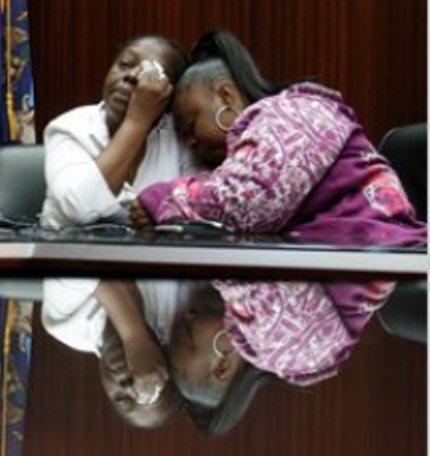
- Fieger press conference after raid: Mertilla Jones and aunt LaKrystal Sanders . AP photo by Carlos Osorio
Jones is possibly expected to testify Sept. 24, in the face of Fishman’s blistering opening statement during which he repeatedly called her a “liar” for saying Weekley deliberately “murdered” Aiyana, and added that two of her sons are in prison. Asst. Prosecutors Moran and Hindelang offered no objection during his statement.
“I figured what all of them came to do was murder,” Jones testified during Weekley’s first trial. “From the way they came in, and they knew there were children in the house, they came to kill, and they just killed a 7-year-old. I saw the officer come in, put the gun to Aiyana’s head, and just shoot. . . . The gun was placed right there at Aiyana’s head, and they pulled the trigger. I saw the light leave out of her eyes, and blood gushed out of her mouth. I knew she was dead.”
Denessa, April and Martin Westbrook described similar circumstances in a 2007 lawsuit they filed against Weekley and other SRT members in federal court.
“Defendants entered the home and did not knock or announce their presence,” their lawsuit said. “Immediately upon barging into the home, Defendants had their guns blazing and they began shooting. There were children and an infant present in the home. Without any justifiable reason whatsoever, Defendants shot Plaintiffs’ two dogs, while a child was in the same room as the dog. Defendants wrongfully detained Plaintiffs for nearly an hour. Defendants had their guns pointed at Plaintiffs and the child and infant.”
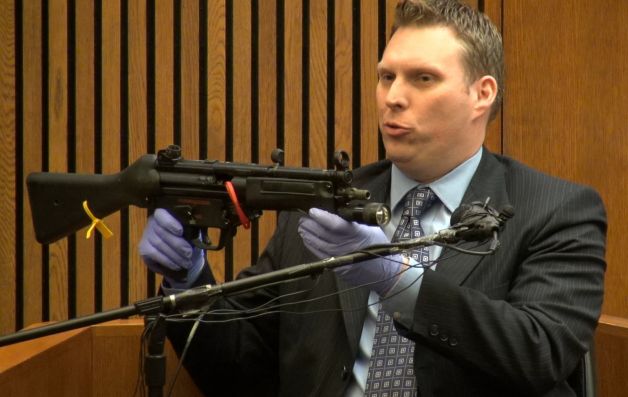
- Brent Sojea, weapons expert, demonstrates MP5 semi-automatic machine gun which killed Aiyana during Weekley’s earlier trial. He testified Sept. 23 again that the gun could not have fired accidentally.
The Westbrook lawsuit for “unconstitutional entry, search, detention and destruction of property” was settled for $27,000 according to Detroit City Council records.
Regarding Fishman’s contention that Weekley did not deliberately fire his gun, firearms and tool markings expert Brent Sojea testified today that was not possible, while other SRT officers testified that they are trained to keep their fingers away from a gun’s trigger even during “firearms retention” if someone tries to seize their weapon.
Sojea confirmed that Weekley’s gun fired the bullet and casing that killed Aiyana, the only ammunition in the room.
Holding Weekley’s Heckler and Koch MP5 submachine gun, Sojea said it could be fired as a semi-automatic or in automatic mode, during which it would fire 800 rounds a minute. He said he tested the gun in numerous ways to see if it could fire without pressing the trigger.
“I tested it by dropping it and banging it on its side, muzzle and butt from different heights onto a rubber mat,” Sojea said. “I used a six-plane safety test, in which I banged on it with a mallet on all sides. It would not fire.”
Sojea said tests showed that the gun required eight to nine pounds of pressure to pull the trigger.
The prosecution also showed evidence technician photographs of the scene and the A&E “First 48” film of the actual raid, from a distance. Another video, likely by police, which showed the raid closer up, has not been introduced by the prosecution.
Several photographs showed brightly colored children’s toys on both sides of the two-family flat’s entrance steps, and on the porch near the entrance to the Jones’ family’s door. But all SRT officers who testified said they saw no evidence of the presence of children, including toys, during the raid. One officer testified all he saw during daytime surveillance was “a mess of people.”
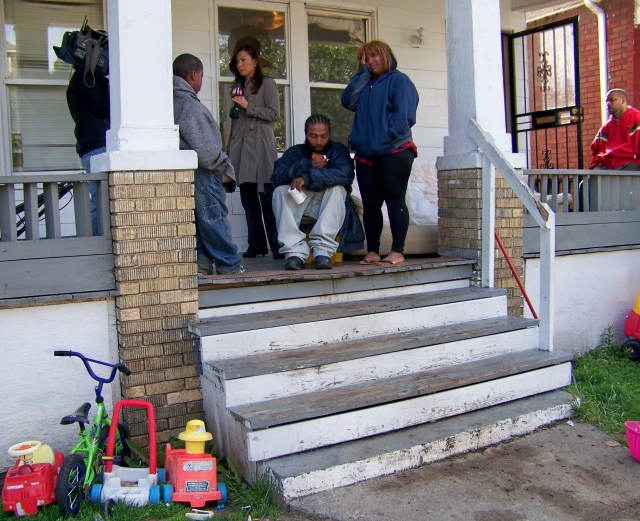
- Charles Jones is interviewed by Channel 2 reporter Amy Lange the morning of his daughter’s death on family’s porch. Toys shown are also in evidence tech photos of the scene directly after the raid.
Dominika and Charles Jones’ five children, including Aiyana and several toddlers, were staying at the home, rented by Mertilla Jones, during the period of surveillance.
Surveillance officers also testified that they radioed a “take-down” crew when one saw Chauncey Owens exiting the downstairs flat and walking up Lillibridge eastbound to E. Canfield. That crew was supposed to apprehend Owens if he was seen outside the house, but surveillance officers claimed the take-down crew did not have enough time to get to him before he returned.
VOD walked the distance from the Lillibridge location to E. Canfield and back, which took approximately four minutes. The take-down crews were waiting only a short distance away from the scene. Many have said police were waiting to set up a dramatic night-time raid for the benefit of crews from A&E’s “First 48” series. Weekley and other officers from the SRT team are featured as stars on A&E’s website for “Detroit SWAT,” the predecessor to “The First 48.”
Particularly striking during testimony by several SRT officers yesterday and today was their use of military terms during their descriptions of events.
They referred to the black uniforms worn by SRT members as “BDU’s” or battle dress uniforms, to the planned raid as a “mission,” and to the Jones home as a “target.” One SRT officer said he was familiar with the tactics because he had served nine years in the U.S. military.
The “First 48” film crew tailing the SRT team during the raid was referred to as “embedded,” a term first coined to describe media crews operating with U.S. forces during various wars in Iraq, Afghanistan and Libya.
According to earlier published reports on the three days of jury selection, a large number of potential jurors were screened out after Judge Cynthia Gray Hathaway, the prosecution and defense read over questionnaires they had filled out. The potential jurors were asked if they had heard about the police killing of Michael Brown in Ferguson, MO, and whether they had read articles about the increasing militarization of U.S. police forces.
The second day of jury selection was dominated largely by the same questions asked personally during voir dire. By the third day, enough jurors had been screened out that “voir dire” focused largely on regular questions regarding their backgrounds and willingness to be fair.
 The sitting jury is now comprised of three Black women, two Black men, one woman who appears to be from India, one woman who appears to be Arab, and seven white individuals. The jury in Weekley’s original trial had only one Black member.
The sitting jury is now comprised of three Black women, two Black men, one woman who appears to be from India, one woman who appears to be Arab, and seven white individuals. The jury in Weekley’s original trial had only one Black member.
One attorney indirectly associated with the case, however, told VOD, “Moran threw the first trial, and it is a conflict of interest for him to prosecute both Weekley and Aiyana’s father Charles Jones, along with Chauncey Owens, for the killing of Jerean Blake.”
Blake was shot to death May 14, 2010, a crime for which both Jones and Owens were convicted, but they are appealing their cases.
On Sept. 18, Wayne County Circuit Court Judge Richard Skutt denied Jones’ motion for either a directed verdict or a new trial, based on his jury’s contradictory verdict finding him guilty of second-degree murder while acquitting him of the gun charges that were the base for the murder charge. His attorneys said they plan to appeal. (VOD story to come on this.)
Previous VOD story on this trial:








